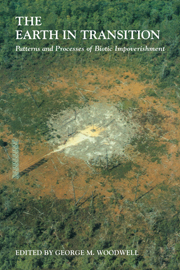Book contents
- Frontmatter
- Contents
- Preface
- Acknowledgments
- List of Contributors
- Part I Global Change and the Patterns of Impoverishment
- 1 The Earth under Stress: A Transition to Climatic Instability Raises Questions about Patterns of Impoverishment
- 2 The Experimental Impoverishment of Natural Communities: Effects of Ionizing Radiation on Plant Communities, 1961 – 1976
- 3 Air Pollution and Temperate Forests: Creeping Degradation
- 4 The Long-Term Effects of Air Pollutants on Lichen Communities in Europe and North America
- 5 Biotic Impoverishment in Northern Peatlands
- 6 Climatic Change and the Survival of Forest Species
- 7 The Atmosphere and the Future of the Biosphere: Points of Interactive Disturbance
- Part II Chronic Disturbance and Natural Ecosystems: Forests
- Part III Chronic Disturbance and Natural Ecosystems: Woodlands, Grasslands, and Tundra
- Part IV Chronic Disturbance and Natural Ecosystems: Aquatic and Emergent Ecosystems
- Part V Conclusion: Steps toward a World That Runs Itself
- Name Index
- Subject Index
2 - The Experimental Impoverishment of Natural Communities: Effects of Ionizing Radiation on Plant Communities, 1961 – 1976
Published online by Cambridge University Press: 24 November 2009
- Frontmatter
- Contents
- Preface
- Acknowledgments
- List of Contributors
- Part I Global Change and the Patterns of Impoverishment
- 1 The Earth under Stress: A Transition to Climatic Instability Raises Questions about Patterns of Impoverishment
- 2 The Experimental Impoverishment of Natural Communities: Effects of Ionizing Radiation on Plant Communities, 1961 – 1976
- 3 Air Pollution and Temperate Forests: Creeping Degradation
- 4 The Long-Term Effects of Air Pollutants on Lichen Communities in Europe and North America
- 5 Biotic Impoverishment in Northern Peatlands
- 6 Climatic Change and the Survival of Forest Species
- 7 The Atmosphere and the Future of the Biosphere: Points of Interactive Disturbance
- Part II Chronic Disturbance and Natural Ecosystems: Forests
- Part III Chronic Disturbance and Natural Ecosystems: Woodlands, Grasslands, and Tundra
- Part IV Chronic Disturbance and Natural Ecosystems: Aquatic and Emergent Ecosystems
- Part V Conclusion: Steps toward a World That Runs Itself
- Name Index
- Subject Index
Summary
Editor's Note: Evolution has been for nearly a century and a half the intellectual core of biology. More recently evolution has been recognized as having shaped and stabilized the surface of the earth as the only habitat for life. The concept is attractive: evolution is building an open-ended, developmental system, self-guided, self-repairing, capable of accommodating all travails in due course, even to the point of building into the biosphere more room for life, more diversity, and greater stability of habitat. Surely, according to this concept, biotic resilience is sufficient to accommodate the activities of Homo sapiens, one species of the several million now on earth, all the product of this magnificently versatile and effective process.
But the timing is off. In the long term of thousands of millennia the glorious vision of a benign and effective evolutionary resilience may be appropriate. In the time of our lives it is the principles of succession and impoverishment that apply.
Succession enjoys all the optimism of any developmental progression, no matter how mean the origins: a bank account, growing with the accrual of interest. Growth is salutary, almost by definition.
- Type
- Chapter
- Information
- The Earth in TransitionPatterns and Processes of Biotic Impoverishment, pp. 9 - 24Publisher: Cambridge University PressPrint publication year: 1991



